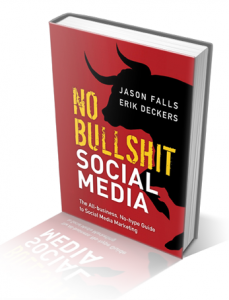There’s a great piece of narration from the Hitchhiker’s Guide to the Galaxy that talks about how certain words, which were once distasteful and unspeakable, are now perfectly acceptable to say.
In today’s modern Galaxy there is, of course, very little still held to be unspeakable. Many words and expressions which only a matter of decades ago were considered so distastefully explicit that were they merely to be breathed in public, the perpetrator would be shunned, barred from polite society, and, in extreme cases, shot through the lungs, are now thought to be very healthy and proper, and their use in everyday speech is seen as evidence of a well-adjusted, relaxed, and totally unf**ked-up personality.
So, for instance, when in a recent national speech, the financial minister of the Royal World Estate of Qualvista actually dared to say that due to one thing and another, and the fact that no one had made any food for awhile and the king seemed to have died, and that most of the population had been on holiday now for over three years, the economy had now arrived at what he called, “One whole juju-flop situation,” everyone was so pleased he felt able to come out and say it, that they quite failed to notice that their five-thousand-year-old civilisation had just collapsed overnight.
I feel that way about No Bullshit Social Media, the book I wrote with Jason Falls. I’m not embarrassed by the title. I’m only worried that this is America’s jujuflop: 1) That no one is shocked by the title because we’ve all heard and said worse, and 2) that everyone is so pleased to see it in print that they fail to notice everything else has collapsed around them.
I can’t remember whose idea the title was, but when we pitched it to our editor, Katherine Bull (@katherinebull) and her department, there wasn’t a whole lot of pushback on it. There was some concern over what some of the bookstores might say, but they were all “meh” about it, so we knew we were golden.
I’m proud of the “No Bullshit” title and I’m proud of the work. There’s no question about that (although I won’t let my kids repeat it). And I know there are still some people who, despite my best efforts, will not speak or even write out the name of the title, despite my entreaties that they should honor the literary integrity of the book’s title.
(I actually respect them for this. But that doesn’t mean I’m going to quit trying to get them to say it.)
We picked the title, because that was the only way to describe the approach we were going to take in the book. That, and because we thought Gary Vaynerchuk might want the title . . .And The Horse You Rode In On for his next book.
So, don’t worry about whether you like the title. If you don’t believe social media is right for your company, you need to read it. You don’t have to say the name, you just have to read the book. This book is for you, whether you like the title or not.
No Bullshit describes the approach and it describes the attitude. We’re not going to snow you with lilting chants about “be a part of conversations with your customers” or other tree-hugging hippie bullshit, as Jason calls it. Social media marketing is about the bottom line. About making money. About finding a way to turn this free marketing channel into one that brings in revenue.
Because the executives and business owners who pooh-pooh social media as a passing fad or merely for young people are missing out on a chance to make more money, win new customers, and ensure their company’s very survival.
And that’s no bullshit.
